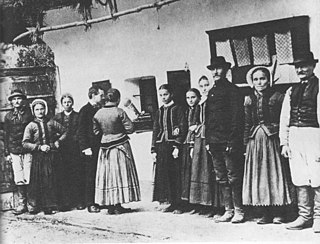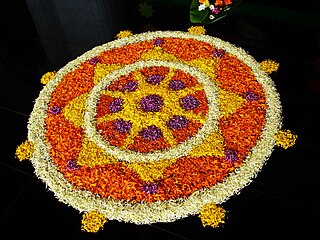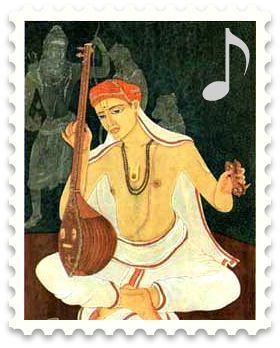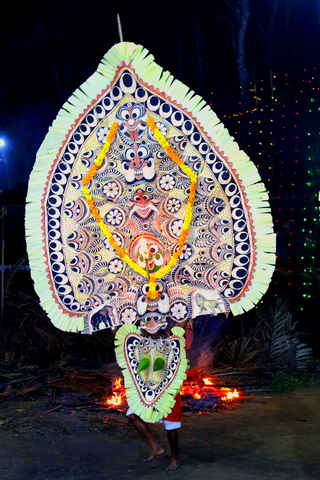
Folk music is a music genre that includes traditional folk music and the contemporary genre that evolved from the former during the 20th-century folk revival. Some types of folk music may be called world music. Traditional folk music has been defined in several ways: as music transmitted orally, music with unknown composers, music that is played on traditional instruments, music about cultural or national identity, music that changes between generations, music associated with a people's folklore, or music performed by custom over a long period of time. It has been contrasted with commercial and classical styles. The term originated in the 19th century, but folk music extends beyond that.

Onam is an annual harvest and cultural festival celebrated mostly by the people of Kerala. A major annual event for Keralites, it is the official festival of the state and includes a spectrum of cultural events.

The Mid-Autumn Festival, also known as the Moon Festival or Mooncake Festival, is a harvest festival celebrated in Chinese culture. It is held on the 15th day of the 8th month of the Chinese lunisolar calendar with a full moon at night, corresponding to mid-September to early October of the Gregorian calendar. On this day, the Chinese believe that the moon is at its brightest and fullest size, coinciding with harvest time in the middle of autumn.

Chinese musicology is the academic study of traditional Chinese music. This discipline has a very long history. Traditional Chinese music can be traced back to around 8,000 years ago during the Neolithic age. The concept of music, called 乐, stands among the oldest categories of Chinese thought; however, in the known sources, it does not receive a fairly clear definition until the writing of the Classic of Music. Chinese music has always been interacting with different cultures throughout its long history, dating back to the Xia and Shang dynasties.
The music of Saint Lucia is home to many vibrant oral and folk traditions and is based on elements derived from the music of Africa, especially rhythmically, and Western Europe, dances like the quadrille, polka and waltz. The banjo and cuatro are iconic Lucian folk instruments, especially a four-stringed banjo called the bwa poye. Celebratory songs called jwé show lyricism, and rhythmic complexity. The most important of the Afro-Lucian Creole folk dances is the kwadril. Music is an integral part of Lucian folk holidays and celebrations, as well as the good-natured rivalry between the La Rose and La Marguerite societies. There is little Western classical music on Saint Lucia, and the country's popular music industry is only nascent. There are few recording opportunities, though live music and radio remain a vital part of Lucian culture. Popular music from abroad, especially Trinidadian styles like calypso and soca, is widespread.

The Malayali people are a Dravidian ethnolinguistic group originating from the present-day state of Kerala & Union Territory of Lakshadweep in India, occupying its southwestern Malabar coast. They form the majority of the population in Kerala and Lakshadweep. They are predominantly native speakers of the Malayalam language, one of the six classical languages of India. The state of Kerala was created in 1956 through the States Reorganisation Act. Prior to that, since the 1800s existed the Kingdom of Travancore, the Kingdom of Cochin, Malabar District, and South Canara of the British India. The Malabar District was annexed by the British through the Third Mysore War (1790–92) from Tipu Sultan. Before that, the Malabar District was under various kingdoms including the Zamorins of Calicut, Kingdom of Tanur, Arakkal kingdom, Kolathunadu, Valluvanad, and Palakkad Rajas.

Kerala music has a complex history distinct from Malayalam poetry, with which it is often associated. Though it is often driven by poetry, Kerala also has its roots in Carnatic music. Songs have always been a significant part of early Malayalam literature dating back to the 9th century CE. The significance of music in Kerala's culture can be deduced from the musical poetry that developed in the Malayalam language long before prose. As music evolved in the region, various branches emerged from it

Oppana is a popular form of social entertainment among the Mappila community of Kerala, South India, prevalent throughout Kerala, especially in Malabar. The term Oppana is believed to be originated from the Arabic word "Affna". Oppana is traditionally used in various important cultural ceremonies, and in particular, is a component of all Mappila weddings. In Kerala, this art form has been revived with much popularity on the performing stages of the Youth Festivals of the student community.

The culture of Kerala has developed over the past millennia, influences from other parts of India and abroad. It is defined by its antiquity and the organic continuity sustained by the Malayali people. Modern Kerala society took shape owing to migrations from different parts of India and abroad throughout Classical Antiquity.

Margamkali is an ancient Indian round dance of the St. Thomas Christians community- based in Kerala state, mainly practiced by the endogamous sub-sect known as the Knanaya or Southist Christians. The dance retells the life and missionary work of Thomas the Apostle, based on the 3rd-century apocryphal Acts of Thomas.

Kerala, a state situated on the tropical Malabar Coast of southwestern India, is one of the most popular tourist destinations in the country. Named as one of the ten paradises of the world by National Geographic Traveler, Kerala is famous especially for its ecotourism initiatives and beautiful backwaters. Kerala has unique culture and traditions coupled with its varied demography. Several international agencies ranging from UNESCO to National Geographic have recognised the state's tourism potential. Kerala was named by TIME magazine in 2022 among the 50 extraordinary destinations to explore in its list of the World's Greatest Places. In 2023, Kerala was listed at the 13th spot in The New York Times' annual list of places to visit and was the only tourist destination listed from India.

The city of Thiruvananthapuram has been the centre of cultural activities of Kerala (India) from the time it was made capital of Travancore in 1745. The capital city is a major intellectual and artistic center. The Thiruvananthapuram Museum and Thiruvananthapuram Zoo were started during the reign of Swathi Thirunal (1813–1847) and are one of the oldest of their kind in India. The city's libraries include the Trivandrum Public library, which was started in 1829. The Swathi Thirunal College of Music and 'College of fine arts' are the leading institutions related to music and arts.

Vengara is a town in Malappuram district of Kerala state, India. It is situated in the Vengara Grama Panchayat and is located in Tirurangadi Taluk.
Vidyodaya School is a private college-preparatory combined-grades school located in Thevakkal, Kochi, India. It provides comprehensive school education from lower primary to grade 12.

Padayani, also known Padeni, is a traditional folk dance and a ritual art from the central portion of the Indian state of Kerala. A ceremonial dance involving masks, it is an ancient ritual performed in Bhagavati temples. The dance is performed in honor of Bhadrakaali. Meaning, a 'row of warriors', Padayani is an art form that blends all music, dance, theatre, satire, facial masks, and paintings. It is part of worship of Bhadrakali and is staged in temples dedicated to the goddess from mid-December to mid-May. Padayani is unique to central Travancore, comprising the Pathanamthitta and Kottayam districts of Kerala. It is also performed in adjoining regions of Kollam, Alappuzha districts.

Cochin Carnival is an entertainment event held every year in the last week of December at Fort Kochi in the city of Kochi, Kerala. This event is held mostly during the last two weeks of December and finally ends on 1 January. It is officially inaugurated with hoisting the Indian national flag at the Vasco da Gama Square.
Ishal is the melodic framework within which Mappila Songs are composed. Though identical to tala(metre ) and raga of Indian music, it has influences from the ancient folk songs of Kerala and Arabian musical traditions.

Malaysian Malayalees, also known as Malayalee Malaysians, are people of Malayali descent who were born in or immigrated to Malaysia from the Malayalam speaking regions of Kerala. They are the second largest Indian ethnic group, making up approximately 15% of the Malaysian Indian population. The bulk of Malaysian Malayali migration began during the British Raj, when the British facilitated the migration of Indian workers to work in plantations, but unlike the majority Tamils, the a large number of the Malayalis were recruited as supervisors in the oil palm estates that followed the kangani system, and some were into trading and small businesses with a significant proportion of them running groceries or restaurants. Over 90% of the Malayalee population in Malaysia are Malaysian citizens.














